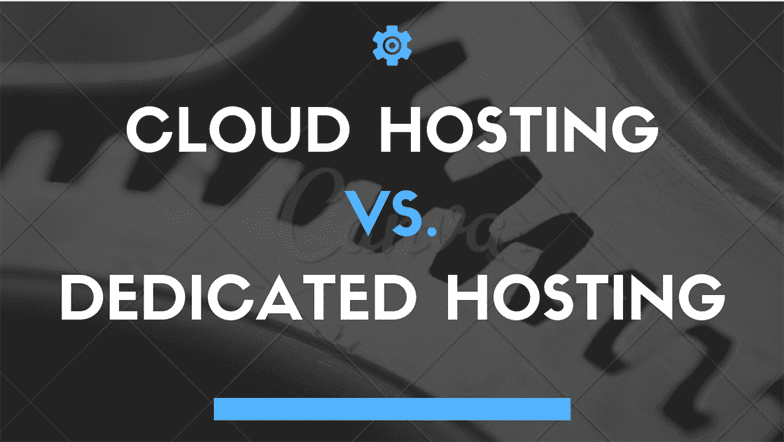Which Is Better: Cloud Hosting or Dedicated Server Hosting?
Both Cloud and Dedicated servers are two types of hosting solutions that you will find across many professional web hosting companies. Whether you're a small business or a thriving enterprise, the question remains: what is the difference between Cloud and Dedicating hosting and which one is the best solution for you?


For the third year in a row, Liquidweb has been ranked by Cloud Spectator as having the highest-rated, server-side performance of any Cloud Hosting-based system.
Because of our knowledge and experience in this area, we are providing a comprehensive break down of the 'Cloud Hosting versus Dedicated Server' hosting environments. This includes other impacting aspects like performance, uptime, and more importantly, cost.
Simply put, cloud hosting is using a large group of servers that share resources and contiguous virtual space. One typical asset of a cloud environment is a Cloud VPS. A Cloud VPS server contains a fully functional operating system which resides inside this shared space.

Cloud hosting can be compared to a large restaurant. The restaurant represents the shared physical space within the group of servers. Within that restaurant's shared space, lives the Cloud VPS's. In this case, we like to think of the Cloud VPS's as being represented by the tables in the restaurant. Assigned to each table is a waitress/waiter. The waitress/waiter for a table is the resources that each table or Cloud VPS have available.
Just like at a restaurant, if the number of your guests grows, you can always add another table (Cloud VPS) to your existing table which then increases the number of waiters/waitresses (or resources) you have available to serve you. As people from your party leave, the extra table is removed and the number of waiters/waitresses (resources) needed goes down to meet your lowered demands.
On the flip side, in a Dedicated Server, you own the whole restaurant and have one huge table to yourself and, the entire waitstaff attends to your every need.
Cost
Cloud hosting usually wins over with price, as there is no hardware to purchase and, you usually only pay for what you use or need. As your business grows, you’ll be able to scale up by adding more space for more or larger websites or scale down to utilize only what's needed. Because Dedicated Servers are actual physical pieces of hardware that you own, sometimes a setup fee can be associated with them.
Having your own Dedicated Server also means you’ll have the freedom of paying for maximum power, even though the server may not be utilizing all of its resources. Your hosting provider can maintain both Cloud VPS and Dedicated servers but, dedicated servers will often need an additional team with a deeper understanding of resource monitoring and troubleshooting. Lastly, Cloud VPS average entry-level VPS servers start at around $60 per month while an entry-level dedicated server starts off around $199 per month.
- An average entry-level server runs about $60 per month
- No hardware to buy
- Unlimited resource scaling
- You only pay for what you use
- Average entry level $199 per month
- Increased stability
- limited resource issues
- May include an initial setup fee
Uptime
Uptime is defined as the amount of time your server is online and available to your users. For most, uptime is of the utmost importance because businesses rely on the revenue or information that their site provides. More frequently, cloud environments uptimes are improving although, there is always the chance of downtime due to resource abuse from other customers residing on the same server.
Dedicated servers face similar issues but, those issues can be due to different reasons such as hardware failures. You’ll also find cloud environments are very resilient and, redundant with their environmental setup and also are ideal when scaling up is needed as this usually involves minimal downtime. When scaling up within a dedicated environment, downtime can have an initial impact on your overall uptime but, this is usually limited to the actual time that's needed to complete the hardware swap. Regardless of the minimal downtime involved in scaling up, dedicated servers are well known for their superb uptime and stability. Dedicated servers are also a favorite of larger e-commerce businesses that need solid performance and speed larger mission-critical websites need.
- More for small to medium business because uptime can sometimes be an issue
- Resilient and Redundant
- Can have occasional downtime due to shared resources
- Great uptime for larger websites, such as e-commerce businesses and high-traffic sites
- One point of failure
Speed
Because the speed of your website is most often the number one concern among website developers and users when differentiating whether the cloud or a dedicated server, the short of it is, dedicated will usually be faster. It can be difficult to compare the VPS or dedicated environments because not all websites are optimized for speed and, front-end and backend development can come into play.
In this instance, we are going to assume the code is sufficient for optimal performance. If we think of our restaurant analogy from earlier, resources (the wait staff) are limited in a Cloud environment. These resources get utilized by the website’s processes so it's possible you may reach a limit that your Cloud Dedicated VPS can't handle as fast as a dedicated server (although, there are some cachingservices you can implement to be more SEO competitive). Remember, resources for dedicated servers are all yours, and this equals out to a significant increase in speed.
- Average page load times
- Extra work needed to implement caching
- Quicker website load times
- High-performance due to unshared resources
You’ll find that determining the current need of your business will help to ease the choice of hosting environments. Dedicated servers remain the best choice where performance is critical if you have the money to spend but, can be somewhat of a downside when scaling up. Most small to medium sites are optimal to run on the cloud or can stand for the occasional downtime and are best for growing businesses. For a side by side comparison, visit our products to see how our Dedicated Servers and Cloud VPS win over big name hosting providers.
Related Articles:

About the Author: Echo Diaz
Throughout Echo's four year stint as a technical support specialist, her passion for breaking down complex concepts had to lead to a career in professional writing. As a former top tier support specialist, she added a distinctive element to her written work that spoke to customer feedback and concerns. Echo occasionally pops her head out from behind her computer to watch her dog energetically run around the yard and unabashedly shovels money into buying tickets to see her favorite musical artists.
Our Sales and Support teams are available 24 hours by phone or e-mail to assist.
Latest Articles
In-place CentOS 7 upgrades
Read ArticleHow to use kill commands in Linux
Read ArticleChange cPanel password from WebHost Manager (WHM)
Read ArticleChange cPanel password from WebHost Manager (WHM)
Read ArticleChange the root password in WebHost Manager (WHM)
Read Article


